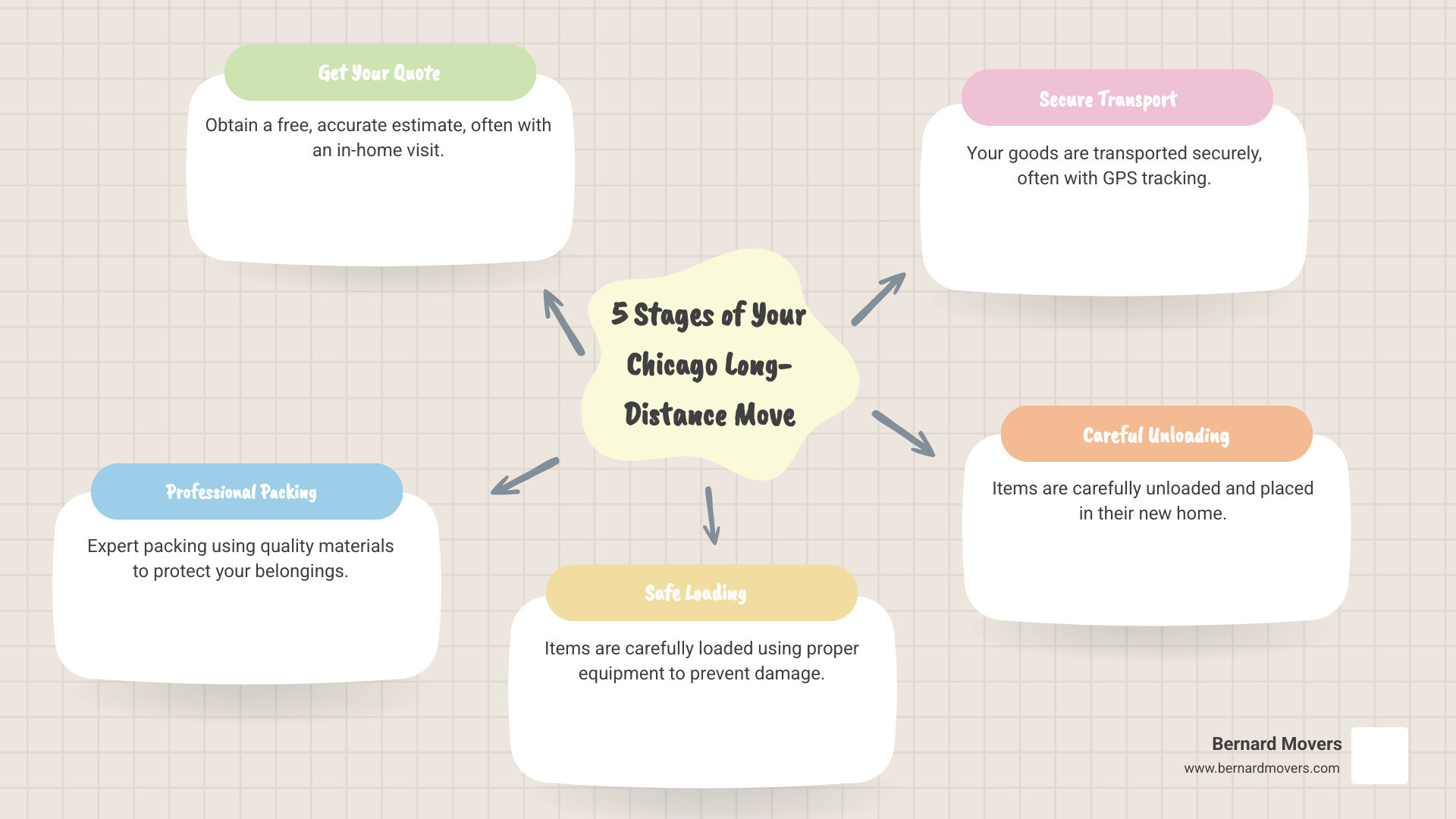Chicago long-distance moving: Your Easy 2025 Guide
What Is a Long-Distance Move from Chicago?
Chicago long-distance moving involves relocating your household across state lines or traveling more than 50 miles within Illinois. Whether you’re heading to sunny Florida, busy New York, or anywhere beyond the Chicagoland area, these moves require specialized planning and professional expertise.
Quick Overview: Chicago Long-Distance Moving Essentials
- Distance: Moves over 50 miles or across state lines
- Timeline: Book 2-3 months in advance (earlier during summer peak season)
- Cost Factors: Distance, shipment weight, services needed, and timing
- Average Delivery: 7-21 days for standard service, 2-5 days for expedited
- Required License: Interstate movers must have a DOT number
Long-distance moves are inherently more complex than local relocations. As one customer noted after their move from Illinois to New Mexico, “the whole process was smooth with no damage” – but this success required working with experienced professionals who understood the logistics involved.
The stress of coordinating everything from packing delicate items to ensuring timely delivery across hundreds or thousands of miles can feel overwhelming. Professional movers eliminate the risk of personal injury from heavy lifting, provide proper equipment for safe transport, and handle the complex logistics that make long-distance relocations successful.
I’m Mina Georgalas, owner and president of Bernard Movers, and I’ve spent nearly 30 years helping Chicago families steer Chicago long-distance moving challenges across 45 states. My experience has shown me that the key to a stress-free relocation lies in choosing the right moving partner who understands both the technical requirements and emotional aspects of leaving Chicago behind.

Easy Chicago long-distance moving glossary:
How to Find a Reputable Long-Distance Moving Company in Chicago
Finding the right Chicago long-distance moving company can feel like searching for a needle in a haystack. But don’t worry – with the right approach, you’ll find a trustworthy partner who’ll treat your belongings like their own family treasures.
Start by reading reviews like you’re researching your next favorite restaurant. Check Google, Yelp, and Facebook for real customer experiences. Look for patterns in the feedback – do people consistently praise their care with fragile items? Do they mention punctual arrivals and transparent pricing? Pay attention to how companies respond to negative reviews too. A professional mover will address concerns thoughtfully rather than getting defensive.
Verify their credentials before anything else. For interstate moves, your mover must have a valid U.S. Department of Transportation (USDOT) number. This isn’t optional – it’s the law. You can easily verify a mover’s authorization here to ensure they’re legitimate. Any reputable company will proudly display their DOT number on their website and marketing materials.
Communication tells you everything you need to know about a company. Slow responses are a major red flag! A company that takes days to return your call or gives vague answers to simple questions won’t suddenly become responsive during your move. Look for movers with professional websites that provide detailed information – like our comprehensive Moving Companies in Illinois Guide.
Getting multiple estimates isn’t just smart – it’s essential. Most reputable movers offer free quotes, and many will conduct in-home or virtual assessments to provide accurate pricing. This process also gives you a chance to evaluate their professionalism firsthand.
Key Qualities to Look for in a Mover
Experience matters more than fancy marketing. Look for companies with decades of service – some movers have been helping families for over 95 years, which speaks volumes about their reliability and expertise. This longevity means they’ve weathered economic ups and downs while consistently serving customers well.
National network affiliations can be a huge advantage for your Chicago long-distance moving needs. Many excellent local movers are agents for larger national van lines, giving them access to resources, equipment, and expertise that smaller independent companies might lack. This affiliation often comes with higher service standards and better accountability.
Customer service awards and consistently high ratings aren’t just nice-to-haves – they’re proof of excellence. Look for companies with ratings like 4.9 out of 5 stars based on hundreds of reviews, or those that regularly receive customer choice awards in their industry.
Transparent pricing should be non-negotiable. A trustworthy mover will honor their quote without surprise charges at delivery. They’ll explain every fee upfront and put everything in writing. No hidden costs, no last-minute “adjustments” – just honest, straightforward pricing.
Red Flags to Avoid When Hiring Movers

Unusually low quotes should make you suspicious, not excited. If a price seems too good to be true, it probably is. Scam artists often use lowball estimates to hook customers, then hold belongings hostage for additional payment. Quality moving services cost money – proper equipment, trained staff, and insurance aren’t cheap.
Large upfront deposits are another warning sign. While reasonable deposits are normal, be wary of companies demanding significant cash payments before they’ve even touched your belongings. Legitimate movers typically collect most payment upon delivery.
No physical address means no accountability. If a company only exists online or provides vague contact information, how will you track them down if something goes wrong? Always verify that your mover has a real, physical location you can visit if needed.
Poor communication during the sales process will only get worse during your actual move. Vague estimates, unreturned calls, or inability to answer basic questions about their services are clear signs to look elsewhere.
Lack of a DOT number for interstate moves means the company is operating illegally. Don’t risk your belongings with unlicensed movers – you’ll have no recourse if things go wrong, and your insurance might not cover damages from unauthorized carriers.
Understanding Services and Costs for Your Chicago Long-Distance Moving Journey
When planning your Chicago long-distance moving trip, understanding the different service options and how costs are calculated helps you make informed decisions. Think of it like ordering at a restaurant – you want to know what’s on the menu and what each dish costs before you commit.
The moving industry offers several service levels to match your needs and budget. Full-service moves handle everything from packing your grandmother’s china to setting up your furniture in your new home. Partial-pack services let you tackle some items yourself while professionals handle the fragile or bulky pieces. Container services work well if you need flexible timing, while expedited moves get you there fast when time is critical.
| Service Type | Description | Best For |
|---|---|---|
| Full-Service | Complete packing, loading, transport, and unpacking | Busy families, long distances |
| Partial-Pack | You pack some items, movers handle the rest | Budget-conscious customers |
| Container | Your items loaded into containers for flexible delivery | Flexible timing needs |
| Expedited | Priority service with faster delivery times | Time-sensitive moves |
Several factors influence your moving costs. Distance plays the biggest role – moving from Chicago to nearby Milwaukee costs less than relocating to sunny California. Shipment weight matters too, since movers charge based on how much your belongings weigh. Labor time for packing and loading adds to the total, and seasonal timing can significantly impact pricing.
Summer represents peak moving season when families relocate before school starts. During these busy months, demand drives prices higher. Smart movers often choose fall or winter moves to take advantage of lower rates and better availability.
Getting a free quote starts your planning process. Companies like ours provide detailed estimates that break down all costs, so you understand exactly what you’re paying for. For budget-conscious families, our Budget Long Distance Movers page offers helpful money-saving tips.
Common Long-Distance Moving Services Offered
Professional Chicago long-distance moving companies offer comprehensive services designed to make your relocation stress-free. Full-service packing means trained professionals carefully wrap and box everything from your kitchen dishes to your bedroom furniture. They bring quality materials and know exactly how to protect your belongings during the long journey ahead.
Partial packing services work perfectly when you want to handle personal items yourself but need help with challenging pieces. Maybe you prefer packing your clothes and books while leaving the professionals to handle your flat-screen TV and dining room set.
Unpacking services at your destination save tremendous time and energy. After a long moving day, having professionals unpack boxes and place items where you want them feels like a luxury. Furniture disassembly and assembly ensures your bedroom set and dining table arrive safely and get properly reassembled in your new home.
Crating services provide extra protection for valuable or fragile items. Antique furniture, artwork, or delicate electronics get custom wooden crates for maximum security during transport.
Storage needs often arise during long-distance moves. Short-term storage helps when your new home isn’t quite ready, while long-term storage works for downsizing situations. Climate-controlled storage protects sensitive items from temperature and humidity changes.
Our Professional Movers State to State service ensures your interstate move gets handled with expertise and care from start to finish.
How is the Cost of a Chicago Long-Distance Moving Trip Calculated?
Understanding moving cost calculations helps you budget accurately and avoid surprises. Weight-based pricing forms the foundation of most long-distance moving costs. Professional movers weigh your shipment before loading and charge according to the total pounds being transported.
Mileage-based pricing adds the distance factor to your cost calculation. Moving from Chicago to nearby Indianapolis costs less per mile than relocating to distant Seattle. The combination of weight and distance creates your base moving rate.
Fuel surcharges reflect current gas prices and help moving companies manage transportation costs. These charges fluctuate with fuel markets but are clearly disclosed in your estimate.
Additional services like packing, storage, or specialty item handling add to your base cost. Each service gets priced separately, so you pay only for what you actually need and use.
Valuation coverage differs significantly from basic insurance. Basic liability (Released Value Protection) comes included but offers minimal coverage – typically 60 cents per pound per item. Full Value Protection costs extra but provides replacement value coverage for lost or damaged belongings. For valuable items making a long journey, this upgrade often proves worthwhile.
Binding estimates guarantee your final cost won’t exceed the quoted amount, assuming your inventory remains accurate. Non-binding estimates provide approximate costs, with final charges based on actual weight and services used. Binding estimates offer more predictability, while non-binding estimates might result in lower costs if your shipment weighs less than estimated.
Understanding these pricing factors helps you make informed decisions about your Chicago long-distance moving investment and ensures no unwelcome surprises on moving day.

